Homework123
On this page, you find all documents, package deals, and flashcards offered by seller Homework100.
- 44
- 0
- 0
Community
- Followers
- Following
44 items
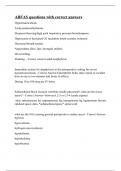
ABFAS questions with correct answers
Hypotension/shock. Tachycardia/arrhythmias. Dyspnea/wheezing/high peak inspiratory pressure/bronchospasm. Hypoxemia or decreased O2 saturation noted on pulse oximetry. Decreased breath sounds. Angioedema (face, lips, laryngeal stridor). Hives/itching. Flushing. - Correct Answer-adult anaphylaxis Immediate actions for anaphylaxis in the perioperative setting for severe hypotension/shock - Correct Answer-Epinephrine bolus (may repeat or escalate dose in one to two minutes and titrate to ...
- Exam (elaborations)
- • 4 pages •
Hypotension/shock. Tachycardia/arrhythmias. Dyspnea/wheezing/high peak inspiratory pressure/bronchospasm. Hypoxemia or decreased O2 saturation noted on pulse oximetry. Decreased breath sounds. Angioedema (face, lips, laryngeal stridor). Hives/itching. Flushing. - Correct Answer-adult anaphylaxis Immediate actions for anaphylaxis in the perioperative setting for severe hypotension/shock - Correct Answer-Epinephrine bolus (may repeat or escalate dose in one to two minutes and titrate to ...

ABFAS practice questions with correct answers
Which of the following treatment options would be the most appropriate to treat a calcaneonavicular coalition in a 20-year-old soft ball player with chronic foot pain? A. orthotics. B. resection with muscle interposition. C. subtalar arthrodesis. D. arthroeresis placement. - Correct Answer-B resection with muscle interposition Which of the following treatment options would be the most appropriateto treat a calcaneonavicular coalition in a 20-year-old soft ball player withchronic foot pa...
- Exam (elaborations)
- • 9 pages •
Which of the following treatment options would be the most appropriate to treat a calcaneonavicular coalition in a 20-year-old soft ball player with chronic foot pain? A. orthotics. B. resection with muscle interposition. C. subtalar arthrodesis. D. arthroeresis placement. - Correct Answer-B resection with muscle interposition Which of the following treatment options would be the most appropriateto treat a calcaneonavicular coalition in a 20-year-old soft ball player withchronic foot pa...

ABFAS PEDIATRIC HIGH YIELD questions with correct answers
Which XRAY view is the most accurate judge of a clubfoot correction - Correct Answer-Lateral stress dorsiflexion view Club foot posterior release, which structures are released - Correct Answer-- inferior/posterior achilles - FHL sheath - ankle and STJ capsule - calcaneao-fibular ligament - posterior talofibular ligaments - *superficial part of the deltoid ligament (talotibial)* - Lengthen FDL to precent claw toe Surgical treatment of club roof after 3 months of failed conservative ...
- Exam (elaborations)
- • 9 pages •
Which XRAY view is the most accurate judge of a clubfoot correction - Correct Answer-Lateral stress dorsiflexion view Club foot posterior release, which structures are released - Correct Answer-- inferior/posterior achilles - FHL sheath - ankle and STJ capsule - calcaneao-fibular ligament - posterior talofibular ligaments - *superficial part of the deltoid ligament (talotibial)* - Lengthen FDL to precent claw toe Surgical treatment of club roof after 3 months of failed conservative ...
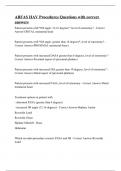
ABFAS HAV Procedures Questions with correct answers
Patient presents with *IM angle: 12-16 degrees*, level of osteotomy? - Correct Answer-DISTAL metatarsal head Patient presents with *IM angle: greater than 16 degrees*, level of osteotomy? - Correct Answer-PROXIMAL metatarsal (base) Patient presents with increased DASA greater than 8 degrees, level of osteotomy? - Correct Answer-Proximal aspect of (proximal phalanx) Patient presents with increased HIA greater than 10 degrees, level of osteotomy? - Correct Answer-Distal aspect of (proxima...
- Exam (elaborations)
- • 14 pages •
Patient presents with *IM angle: 12-16 degrees*, level of osteotomy? - Correct Answer-DISTAL metatarsal head Patient presents with *IM angle: greater than 16 degrees*, level of osteotomy? - Correct Answer-PROXIMAL metatarsal (base) Patient presents with increased DASA greater than 8 degrees, level of osteotomy? - Correct Answer-Proximal aspect of (proximal phalanx) Patient presents with increased HIA greater than 10 degrees, level of osteotomy? - Correct Answer-Distal aspect of (proxima...
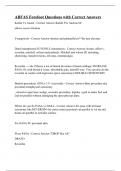
ABFAS Forefoot Questions with Correct Answers
Kalish Vs Austin - Correct Answer-Kalish 55o Austion 60 allows screws fixation Youngswick - Correct Answer-shorten and plantarflexes**for met elevatus Distal metaphyseal JUVENILE osteotomies - Correct Answer-Austin, offset v, reverdin, mitchell, wilson and peabody. Mitchell and wilson SE including shortening, transfer lesions, elevatus, metatarsalgia Reverdin --->do if theres a ton of lateral deviation of head cartilage=INCREASE PASA. fix with buried k wires, absorbable pins, monofi...
- Exam (elaborations)
- • 11 pages •
Kalish Vs Austin - Correct Answer-Kalish 55o Austion 60 allows screws fixation Youngswick - Correct Answer-shorten and plantarflexes**for met elevatus Distal metaphyseal JUVENILE osteotomies - Correct Answer-Austin, offset v, reverdin, mitchell, wilson and peabody. Mitchell and wilson SE including shortening, transfer lesions, elevatus, metatarsalgia Reverdin --->do if theres a ton of lateral deviation of head cartilage=INCREASE PASA. fix with buried k wires, absorbable pins, monofi...
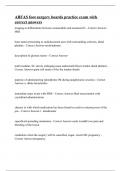
ABFAS foot surgery boards practice exam with correct answers
imaging to differentiate between sesamoiditis and sesamoid fx - Correct Answer-MRI bone tumor presenting as radiolucement area with surrounding sclerosis, distal phalanx - Correct Answer-enchondroma description fo glomus tumor - Correct Answer- multi nodular, SC slowly enlarging mass underneath flexor tendon distal phalanx - Correct Answer-giant cell tumor of the the tendon sheath purpose of administering epinephrine IM during anaphylactic reaction - Correct Answer-a. dilate bronchio...
- Exam (elaborations)
- • 4 pages •
imaging to differentiate between sesamoiditis and sesamoid fx - Correct Answer-MRI bone tumor presenting as radiolucement area with surrounding sclerosis, distal phalanx - Correct Answer-enchondroma description fo glomus tumor - Correct Answer- multi nodular, SC slowly enlarging mass underneath flexor tendon distal phalanx - Correct Answer-giant cell tumor of the the tendon sheath purpose of administering epinephrine IM during anaphylactic reaction - Correct Answer-a. dilate bronchio...
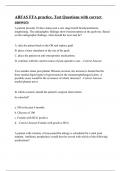
ABFAS FFA practice. Test Questions with correct answers
A patient presents 10 days status post a one stage fourth brachymetatarsia lengthening. The radiographic findings show boneresorption at the graft site. Based on the radiographic findings, what should the next step be? A. take the patient back to the OR and replace graft. B. place a bone stimulator at the site of the graft. C. place the patient on anti-osteoporotic medications. D. continue with the current course of post-operative care. - Correct Answer- Two months status post plantar f...
- Exam (elaborations)
- • 14 pages •
A patient presents 10 days status post a one stage fourth brachymetatarsia lengthening. The radiographic findings show boneresorption at the graft site. Based on the radiographic findings, what should the next step be? A. take the patient back to the OR and replace graft. B. place a bone stimulator at the site of the graft. C. place the patient on anti-osteoporotic medications. D. continue with the current course of post-operative care. - Correct Answer- Two months status post plantar f...

ABFAS Epiphyseal plate fractures questions with correct answers
Physis 3 distanct zones - Correct Answer-zone of growth zone of cartilage maturation zone of cartilage transformation zone of growth - Correct Answer-is closest to the epiphysis and contains resting chondrocytes that progress to dividing cells that arrange in columns. zone of cartilage maturation - Correct Answer-the weakest region due to loss of intracellular matrix. zone of cartilage transformation - Correct Answer-displays cartilage converting to bone. Periosteum is more vasculariz...
- Exam (elaborations)
- • 4 pages •
Physis 3 distanct zones - Correct Answer-zone of growth zone of cartilage maturation zone of cartilage transformation zone of growth - Correct Answer-is closest to the epiphysis and contains resting chondrocytes that progress to dividing cells that arrange in columns. zone of cartilage maturation - Correct Answer-the weakest region due to loss of intracellular matrix. zone of cartilage transformation - Correct Answer-displays cartilage converting to bone. Periosteum is more vasculariz...
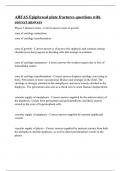
ABFAS Epiphyseal plate fractures questions with correct answers
Physis 3 distanct zones - Correct answer-zone of growth zone of cartilage maturation zone of cartilage transformation zone of growth - Correct answer-is closest to the epiphysis and contains resting chondrocytes that progress to dividing cells that arrange in columns. zone of cartilage maturation - Correct answer-the weakest region due to loss of intracellular matrix. zone of cartilage transformation - Correct answer-displays cartilage converting to bone. Periosteum is more vasculariz...
- Exam (elaborations)
- • 4 pages •
Physis 3 distanct zones - Correct answer-zone of growth zone of cartilage maturation zone of cartilage transformation zone of growth - Correct answer-is closest to the epiphysis and contains resting chondrocytes that progress to dividing cells that arrange in columns. zone of cartilage maturation - Correct answer-the weakest region due to loss of intracellular matrix. zone of cartilage transformation - Correct answer-displays cartilage converting to bone. Periosteum is more vasculariz...
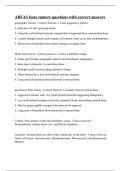
ABFAS bone tumors questions with correct answers
geographic lesions - Correct Answer-1. Least aggressive pattern 2. Indicative of slow growing lesion 3. Uniquely well-defined sclerotic margin that is separated from surrounding bone 4. Usually benign lesions such as giant cell tumors, bone cysts, and enchondromas 5. Short zone of transition from tumor changes to regular bone Moth eaten lesion - Correct Answer-1. Lacks a definitive shape 2. Faster growth than geographic pattern which indicates malignancy 3. Seen more commonly in cancell...
- Exam (elaborations)
- • 10 pages •
geographic lesions - Correct Answer-1. Least aggressive pattern 2. Indicative of slow growing lesion 3. Uniquely well-defined sclerotic margin that is separated from surrounding bone 4. Usually benign lesions such as giant cell tumors, bone cysts, and enchondromas 5. Short zone of transition from tumor changes to regular bone Moth eaten lesion - Correct Answer-1. Lacks a definitive shape 2. Faster growth than geographic pattern which indicates malignancy 3. Seen more commonly in cancell...
